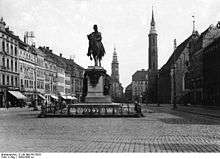Johannes Pfuhl

Equestrian statue of Kaiser Wilhelm I with Otto von Bismarck and Helmuth von Moltke, in Görlitz (1893; destroyed)
Johannes Pfuhl (20 February 1846 – 5 May 1914) was a German sculptor.
Biography
He was born in Löwenberg, in the Prussian Province of Silesia. He studied in the Berlin Academy of Fine Arts under Hermann Schievelbein. He became his master's assistant and completed his plans for the bronze memorial once in the Dönhoffplatz (now the Marion-Gräfin-Dönhoff-Platz), Berlin. Soon after Schievelbein's death Pfuhl settled in Charlottenburg. He made a few portrait busts, but his more typical products were colossal groups or reliefs.
Works
- frieze in rilievo, commemorating the Franco-Prussian War, for the military school of Groß Lichterfelde, Berlin (1876; destroyed)
- statue of Count Stolberg, in Landeshut, Silesia
- “Perseus Liberating Andromeda,” a fountain decoration in Posen (1884, go to Johannes Pfuhl to see the photo), and also in the Goethe Theatre (Theater des Westens?) in Charlottenburg (1896, removed)
- “Theseus, Hippodameia, and Eurytion” (1886)
- equestrian statue of William I with Otto von Bismarck and Helmuth von Moltke, in Görlitz (1893; destroyed)
- Heinrich Laube monument at Sprottau (1895)
- Goethe monument (1902)
- standing group of William I and Frederick III (1902; destroyed)
- William I, for the Reichstag building (1905)
Notes
References
-
 Rines, George Edwin, ed. (1920). "Pfuhl, Johannes". Encyclopedia Americana.
Rines, George Edwin, ed. (1920). "Pfuhl, Johannes". Encyclopedia Americana. -
 This article incorporates text from a publication now in the public domain: Gilman, D. C.; Thurston, H. T.; Colby, F. M., eds. (1905). "Pfuhl, Johannes". New International Encyclopedia (1st ed.). New York: Dodd, Mead.
This article incorporates text from a publication now in the public domain: Gilman, D. C.; Thurston, H. T.; Colby, F. M., eds. (1905). "Pfuhl, Johannes". New International Encyclopedia (1st ed.). New York: Dodd, Mead.
| Wikimedia Commons has media related to Johannes Pfuhl. |
This article is issued from Wikipedia - version of the 10/21/2016. The text is available under the Creative Commons Attribution/Share Alike but additional terms may apply for the media files.